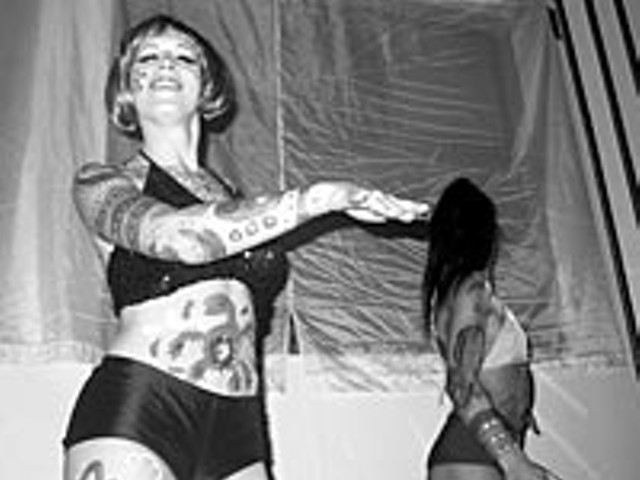In the world of Detroit blues-based rock ’n’ roll, where for years bands have done the bump-and-grind with little more than trash-toned guitars and just-the-facts beats, it was bound to come down to something as minimal as Jawbone.
He’s one man, one band with one record in his hand, who’s already squawked loud enough to be heard in the UK, where BBC’s make ’n’ break DJ John Peel spins his songs with regularity and awaits his arrival. On April 14, Jawbone will be in Britain for a prestigious Peel Session and tour. A single will be out on UK’s Rex Records.
How did Mr. Peel — whose stature in disc jockeydom has reached heights formerly attained by the likes of Alan Freed, Murray the K and Rodney Bingenheimer — get his hands on a copy of Jawbone’s debut, Dang Blues?
The answer is simple. Jawbone sent it to him. But that John Peel actually sifted through his massive pile of CDs, vinyl and whatnot, played the thing, phoned Detroit and booked Jawbone for the Peel Session is astounding, especially to Jawbone.
“He’s been playing it like crazy,” Jawbone says. “He’s almost played every cut on it. They said I could do a live thing, so that’s what I’m going to do.”
For now, though, London town can wait. It’s more likely you’ll see Jawbone and his melodious contraptions on a puny club stage nearby or, miraculously, on the downtown streets of Detroit, where he’s braved the elements and played to the few, the converted and the homeless.
On street or stage, Jawbone is a hardworking man. He blows the harp, kicks a drum, and attacks the six-string while forcing yarns of monkey paws and six-fingered hands through a distorted, antique microphone. With sound gear powered by jumper cables and a car battery, Jawbone (aka Bob Zabor), can take his tent show anywhere.
Maybe from the halls of Montezuma to the shores of Tripoli, but more likely Detroit, Chicago, Chattanooga, Baton Rouge, as Chuck Berry would say. Because in spite of his bluesy finish, Jawbone sports a rock ’n’ roll hair shirt.
Former guitarist and singer for the Gear, a local trio heavily influenced by the Who-Stones-Beatles triumvirate that tromped on area stages in the late ’80s and early ’90s, Jawbone has since learned a thing or two about a thing or two.
He got married and settled in Ferndale, where he and his wife are raising two children, and, in the interim, between the Gear and reincarnating as Jawbone two years ago, he self-published poetry books before he caught the boogie disease.
The nature of his affliction is evident on his recent self-released effort, Dang Blues, a 14-song romp that pairs Jawbone’s twisted poetic flash with sheer electric force. And Jawbone might not want to get well; after all, it took a lot of digging to get him from the veneer of the British invasion to the Bayou.
“I’d say my influences for the CD were Bo Diddley, Charlie Patton and Mississippi Fred McDowell,” Jawbone says. “And Dr. Ross. Dr. Ross was an influence of course.”
It should be noted that Dr. Isaiah Ross — who migrated from Mississippi and made his home in Flint — may not have invented the Boogie Disease but he at least infected the world with a particular strain.
The boogie itself had already been popularized by John Lee Hooker, a virtual one-man band who made Detroit home and whose staccato guitar and thumping foot coursed through 1948’s “Boogie Chillun’” like a cat bear on the loose.
But in the world of one-man bands where Jawbone is suddenly carving his niche, Dr. Ross remains both Godzilla and King Kong. He strapped on a guitar, he blew the harp and he stomped on foot drums and cymbals here, there and everywhere.
Known reverently as the Harmonica Boss, Ross earned his honorary degree in the early ’50s when he became “medical” director for “The Royal Amalgamated Association of Chitlin’ Eaters of America, Incorporated for the Preservation of Good Country Blues,” an organization founded by WDIA-Memphis DJ A.C. “Mr. Blues” Williams.
The doctor recorded for Sun and Chess records before he settled in Michigan in 1954 and began recording for Detroit‘s Fortune label, where he truly exploited the one-man boogie concept until his death about a decade ago.
Besides an inclination to boogie, the doctor and Jawbone share an affinity with the Big Three. But while Dr. Ross spent his working life as a janitor for General Motors, Jawbone spends his days grinding out computer software for Chrysler.
But that’s an aside. As in the tunes of Dr. Ross, the essence of Jawbone is located in the simple but powerful mouth harp. Jawbone says he only added the guitar to legitimize himself.
“Awhile back I was in New York busking in the subway and when I would do my harmonica bit, I got the feeling that people thought that it was all a come-on for drug money or something,” he says.
The difference between Jawbone and a lot of other musicians, though, is the notion that his band would consist only of himself, but that he himself would not be himself.
With a nod toward like-minded inspirations Joe Hill Louis, Jesse “The Lone Cat” Fuller, Frank Frost and the aforementioned Doctor, Jawbone took on the true meaning of the word “solo” out of necessity. And for the moment, he says he doesn’t want it any other way.
“I don’t know what playing with other people would add to what I’m doing,” explains Jawbone. “That might sound a little conceited but I’m not looking for the big band sound. I want it really simple. Stripped down.
“People get frustrated looking for people to play with,” he continues. “It just takes a certain kind of person to say they’re going to do it themselves and I admire that.”
Admiration is a good word for what I felt when I first saw Jawbone months ago at the Lager House, where very few people had gathered for a three-band bill.
In from the cold, the slight, bespectacled thirty-something assembled a jigsaw of foot pedals, drum gear and amplifiers before he unsheathed his guitar and donned a harmonica harness.
Leery of a guy-with-a-guitar recital, I stepped outside the Lager House’s performance space and made my way toward the bar. Then, out of nowhere, I was sonically accosted with what sounded like a miner trapped in a coal mine: This spindly singer simply delivered.
The experience was akin to witnessing a madman’s confession, screeched out during an electrocution and spoken to no one in particular.
Spat lyrics about two-headed dogs, rotgut wine, chicken backs and gator slaw, all of which, as Jawbone says, is rock ’n’ roll. His songs of mayhem and redemption profess anything but blues as a dejected feeling.
“They’re not blues ‘sad’ songs,” he says. “Sometimes I just want them to be a groove, or I want them to be funny. Blues is a pretty broad term. You could lump me in with rock ’n’ roll. They’re all so broad.”
If anything, Jawbone’s repertoire celebrates both rock ’n’ roll and the blues, and are the sort of skewered spirituals that march a terrain imprinted either today, 50 years ago, or centuries ago, depending upon perspective.
What’s marvelous is that he’s able to stand (or sit) there and testify, sans backup, in loud commanding tones.
In accordance with his live show, Dang Blues is a stripped-down piece of work. Recorded in his basement on a four-track recorder, there is little in the way of overdubs that might cloud the works. And though Jawbone fancies himself an anti-purist, this is pure stuff, with Bo Diddley and Fred McDowell covers thrown in for good measure.
Yet, if it wasn’t for Slim Harpo, there would be no Jawbone. If it wasn’t for Dr. Ross, there would be no Jawbone. Hell, if the Stones never existed, there would be no Jawbone.
And now, because of John Peel’s out-of-the-blue interest, Jawbone is suddenly popular in England.
But the beauty is Jawbone can be Jawbone anywhere. He’s humble enough that he doesn’t need the stage at the Lager, or anywhere else. In fact, the great outdoors works just fine.
“Some people talk to you,” he says of his makeshift, under-the-sky shows, “mostly homeless people. They’re the friendliest.”
Jawbone will perform at the Hamtramck Blowout on Saturday, March 6, at Baker’s Streetcar Lounge (9817 Joseph Campau, Hamtramck, 313-873-8296).
Mike Murphy is an area musician and a freelance writer. E-mail [email protected].




